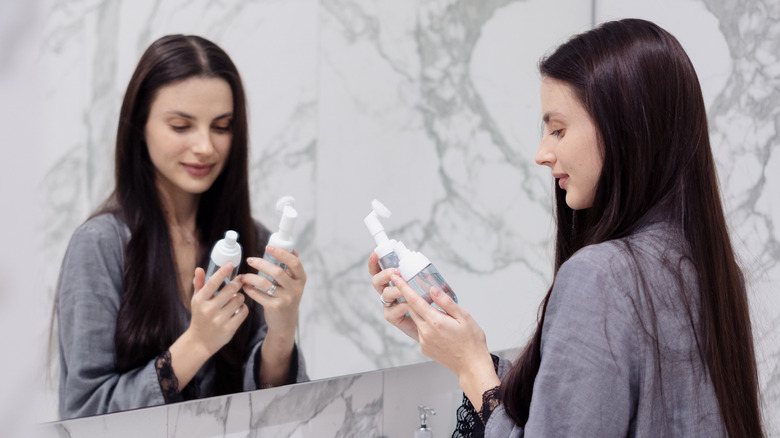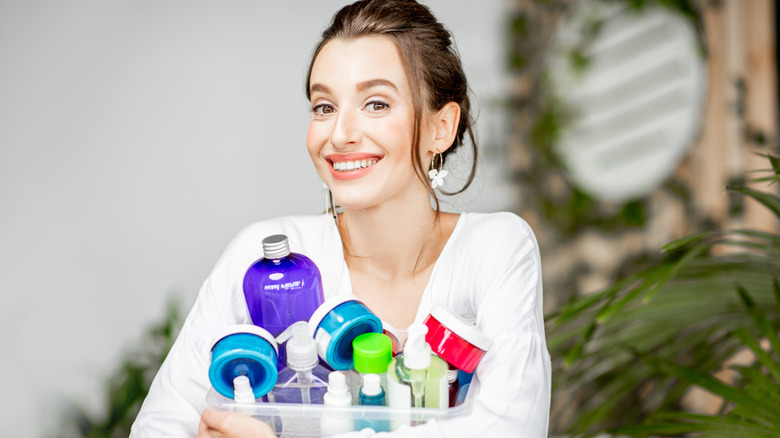5 Reasons Skincare Isn't Improving Your Skin
We may receive a commission on purchases made from links.
If you've been faithfully sticking to your skincare routine without results, it's time to take a step back and reassess. Skincare products are treatments, just like medicines, and they need some time to work their magic.
How long should you wait before expecting noticeable improvements? In general, most skincare products are expected to deliver visible results within six months. Some products, like AHAs, can give you noticeable improvements after just a few uses. But others, like retinoids, might take weeks before you see the full effects.
So, if you've been diligently following your skincare routine twice a day, at least five times a week, for six months to a year, and you still haven't seen any changes, there may be some other factors at play. Don't worry, though! It's just a matter of figuring out what might be causing the delay in seeing results. Here are a few likely reasons skincare isn't improving your skin.
Your skin frequently touches dirty sheets, towels, and hands
Gorgeous skin starts with banishing dirt! It's the culprit behind many skin issues, like acne, excessive oiliness, and dangerous infections. Just one night on a dirty bedsheet can undo all the hard work you've put into your skincare routine for an entire month. Terrible! When your skin makes contact with dirt, the consequences are almost immediate.
The dirt mixes with your skin's oils and dead cells, clogging up your pores. And if that gunk isn't cleaned soon enough, that mixture can harden, leading to whiteheads and blackheads. But wait, it gets worse. Clogged pores create the right environment for bacteria, which causes inflammations that fill with pus. All this drama stems from the simple act of dirt clogging up your pores, and stopping the chain reaction starts with an anti-dirt regimen.
To begin, keep your hands off your face unless they're squeaky clean. Your hands pick up tons of dirt and bacteria throughout the day; a single touch can transfer that to your face. Next up, let's talk bedding hygiene. Changing your pillowcases daily is like giving your face a fresh start every night. It may sound excessive, but trust us; it's worth it. A nifty little tip is to grab a bunch of small face towels. They'll keep you from reusing a dirty towel each time with less laundry to worry about. Shop this pack of 24 mini microfiber towels for just $10.
You're using the wrong products for your skin
Are you using the wrong products without knowing it? Using the product with the highest five-star reviews is not a foolproof approach. It is crucial to understand what ingredients your skin likes, but it's important to know that this knowledge isn't written anywhere. Your skin is unique, so blog posts about the skincare ingredients you should look for if you have oily skin can only guide you. Similarly, posts about the skincare ingredients you should look for if you have dry skin can only give you foundational knowledge. It's up to you to build up on that knowledge and understand your skin's unique needs.
So, how can you do this? Start by reducing your routine to only a facial wash, moisturizer, and sunscreen. Start with this essential trio and observe how your skin reacts. Does your skin feel excessively dry after your wash, or does it feel too oily? Does your moisturizer make you sweaty? Note how these products work and gauge their performance by how your skin feels and looks.
This break period allows your skin to detox from any potentially harmful products while giving you the chance to start afresh with a better-planned strategy. To do this, slowly add products after a month. Start with a serum, but ensure that it contains ingredients that are good for your skin type while promising to address whatever issues you need help with.
Your skincare knowledge is insufficient
If you've been disappointed by the lack of results from your skincare routine, your skin likely needs a little extra attention that basic skincare can't provide. DIY facials offer a fantastic and affordable way to meet those complex needs by incorporating additional steps or skincare tools. One valuable tip is to incorporate facial masks into your routine. Facial masks offer many benefits, so choosing masks that complement your existing routine and cater to your specific needs is crucial. Start by learning about the face mask ingredients you should look for based on your skin type.
This ensures the mask will improve your skin without drawbacks. After all, you don't want a mask that controls excess oil but leaves your skin dehydrated. Another essential tip is to invest in good skincare tools. While the market is flooded with unnecessary and overhyped gadgets, there are hidden gems that deliver on their promises. But before making any purchase, research the tool you're considering to ensure its efficacy and safety for your skin type and issues.
Remember, insufficient knowledge isn't limited to skincare products alone. It's crucial to extend your research to include your makeup products and devices too. Ensuring your cosmetics are not contributing to your skin issues is just as important. With the proper knowledge and extra effort, you can take charge of your skin and achieve a radiant complexion.
You're focusing on quantity
When it comes to skincare products, it's no secret that quality beats quantity. A high-quality moisturizer and sunscreen routine will yield better results than a five-step routine with mid products. So, how can you tell quantity from quality since price isn't always an indicator? Start by choosing the right products based on your needs. Look for high-quality, beneficial ingredients like antioxidants, vitamins, peptides, hyaluronic acid, and natural botanical extracts.
What to avoid? Ingredients like parabens, sulfates, phthalates, and synthetic fragrances may have adverse effects and are a no-no, so be sure to avoid these skincare ingredients if you have sensitive skin. Extravagant claims and promises are also red flags. Search for products that have undergone clinical studies and certifications or are recommended by dermatologists. Then, you can consider the price and reviews. These two aren't always accurate indicators, so they should be your last considerations.
If you often struggle with clogged pores, a major tip is to check for "non-comedogenic" to ensure the product is less likely to cause adverse reactions. When introducing a new product, ensure your skincare routine has been consistent for at least a month. It's also advisable to introduce only one new product at a time. This way, you can monitor how each product affects your skin without other factors influencing the results. Lastly, it's best to stick to products that you have consistent access to. Switching too often can make determining what works best for your skin difficult.
You're using your products ineffectively
One common skincare mistake is not using products in the correct dosage. Skincare treatments require specific daily amounts for optimal results, so it's essential to follow the recommended dosage provided by the manufacturer. Underusing products may not deliver the desired benefits, while excessive use can potentially clog pores and cause other issues. Certain active ingredients like retinol or exfoliants can cause irritation and sensitivity when used in high concentrations, so it's crucial to use them as directed and observe how your skin reacts.
Another mistake to avoid is using skincare products in the incorrect application order. In an interview with Dermstore, board-certified dermatologist Heather Rogers highlighted that applying products in the wrong order can diminish their efficacy. For instance, if a heavy cream is applied before a lighter serum, it may create a barrier that prevents the serum's active ingredients from effectively penetrating the skin. To maximize the benefits of your products, research and understand the recommended application order specific to your skincare routine.
In addition, it's vital to avoid combining incompatible skincare products. Certain ingredients should not be mixed, as they can compromise efficacy and potentially harm your skin. Understanding ingredient compatibility will give your skin a chance to feel and look healthy.





